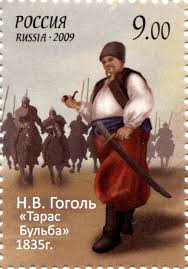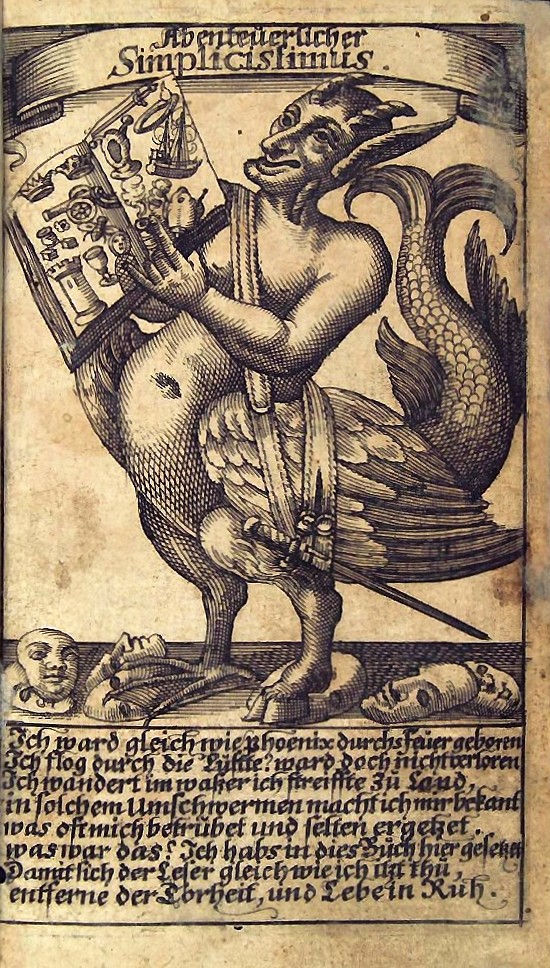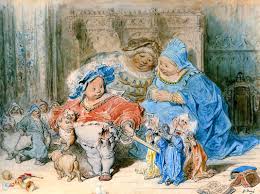From Coffee Shop Corners: First Novels in Their Original Language
There is something very magical about slipping into a comfy chair in your favourite cafe with a coffee within your reach and a book open on your lap, ready for you to delve into. As we continue our look at first novels in original languages, perhaps we can let our minds wander and imagine those early bookworms curled up in a similar manner, fingers pressed over their lips to hide the smile threatening to brim over at the words they are reading. Join us!
Gargantua and Pantagruel via Wikipedia
French
France has some incredible examples of literature dating all the way back to the Middle Ages. Yvain ou le Chevalier au Lion and La Chanson de Roland are some of the very earliest, however both of these are strictly speaking poems, not novels, so they cannot really be considered on our first novel list. And if we continue with such brutal categorising as we did with English works in the first part of this series, we must also reject Lancelot-Graal because it is merely a retelling of a legendary story rather than something that is, well, novel, and original.
Gargantua and Pantagruel is our first true rightful contender for being a first novel, although strictly speaking this is in fact a series of novels. Published by François Rabelais, the first of the series, Pantagruel, is thought to have been published around 1532. This book deals with Pantagruel, a giant, scholarly character who along with a group of friends intoxicates a giant army and does all sorts of unspeakable things to them. The story is not for the faint-hearted; though satirical and amusing in places there is a lot of vulgarity surrounding violence and crudity, as well as more scatological humour than will ever be necessary.

Taras Bulba via Wikipedia
Russian
One of the very earliest Russian novelists was satirist Antiokh Dmitrievich Kantemir, although most of his work was poetry and translations of other works into Russian. And with much of Russia’s early historical literature being anonymous chronicles, where does that leave us in our quest for first novels? When you think of Russian literature you probably already know the name Leo Tolstoy because of Anna Karenina, but the very first - and great Russian novelist was Nikolai Gogol. Вечера́ на ху́торе близ Дика́ньки (Evenings on a Farm Near Dikanka) is a series of short stories, and some of Gogol’s earliest work, written in 1831. Тара́с Бу́льба (Taras Bulba) is probably Gogol’s first work we can truly consider a novel, however.
Published in 1835 as the first of a series, the story follows the lives of the sons of Zaporozhian Cossack Taras Bulba, Ostap and Andriy, and their journeys through first loves and fighting in wars. It is a romanticised historical novel, a satirical look at political corruption, and was just one of the works contributing to Gogol’s eventual exile from Russia.
Learning a new language? Check out our free placement test to see how your level measures up!

Simplicius Simplicissimus via Wikipedia
German
German literature has gone through a lot of periods of evolution, from Old High German literature back in 750 ACE to the contemporary German literature of today. Der abenteuerliche Simplicissimus Teutsch (Simplicius Simplicissimus), written by Hans Jakob Christoffel von Grimmelshausen in 1668 is often considered one of the best early novels written in German, but for a true first, we can actually go back even earlier. Ritter Galmy aus Schottland was written by Georg, or Jörg Wickram in 1539. It is the romantic tale of a simple knight who has the misfortune to fall in love with an already-married duchess. This is not the story of an affair; both characters behave admirably and resist the urge for adultery until the husband dies. There is chivalry, there is romance, there is emotion; this book is said to have been an attempt to create a modern style of fiction focusing on the middle-classes, but that sounds rather cold and clinical to us. In short, if you like your romance fiction, this one is for you!
Polish
Our final first novel this week comes from Poland, a country that has an incredible, varied history that has been captured by playwrights, novelists and poets alike. Mikołaja Doświadczyńskiego przypadki (The Adventures of Mr. Nicholas Wisdom) was written by Ignacy Krasicki, also known as ‘the prince of poets’, in 1776. The story follows the life of Polish nobleman Mikołaj Doświadczyński (Nicholas Experience), and his quest to become a better man and therefore citizen through his adventures in Warsaw, Paris, and a fictional island called Nipu (which is loosely based on Japan). The Adventures of Mr. Nicholas Wisdom is an apologia for the Enlightenment and physiocratism, and is considered to be a milestone in Polish literature, but perhaps more importantly, it is simply a really good read.

Photo via Pexels
Our coffee is drained, our hearts are happily full of fiction; it’s time to step outside into the sun and get some fresh air. But join us next week for our final look at first novels in original languages; let’s see if we can add some new material to your reading list!



